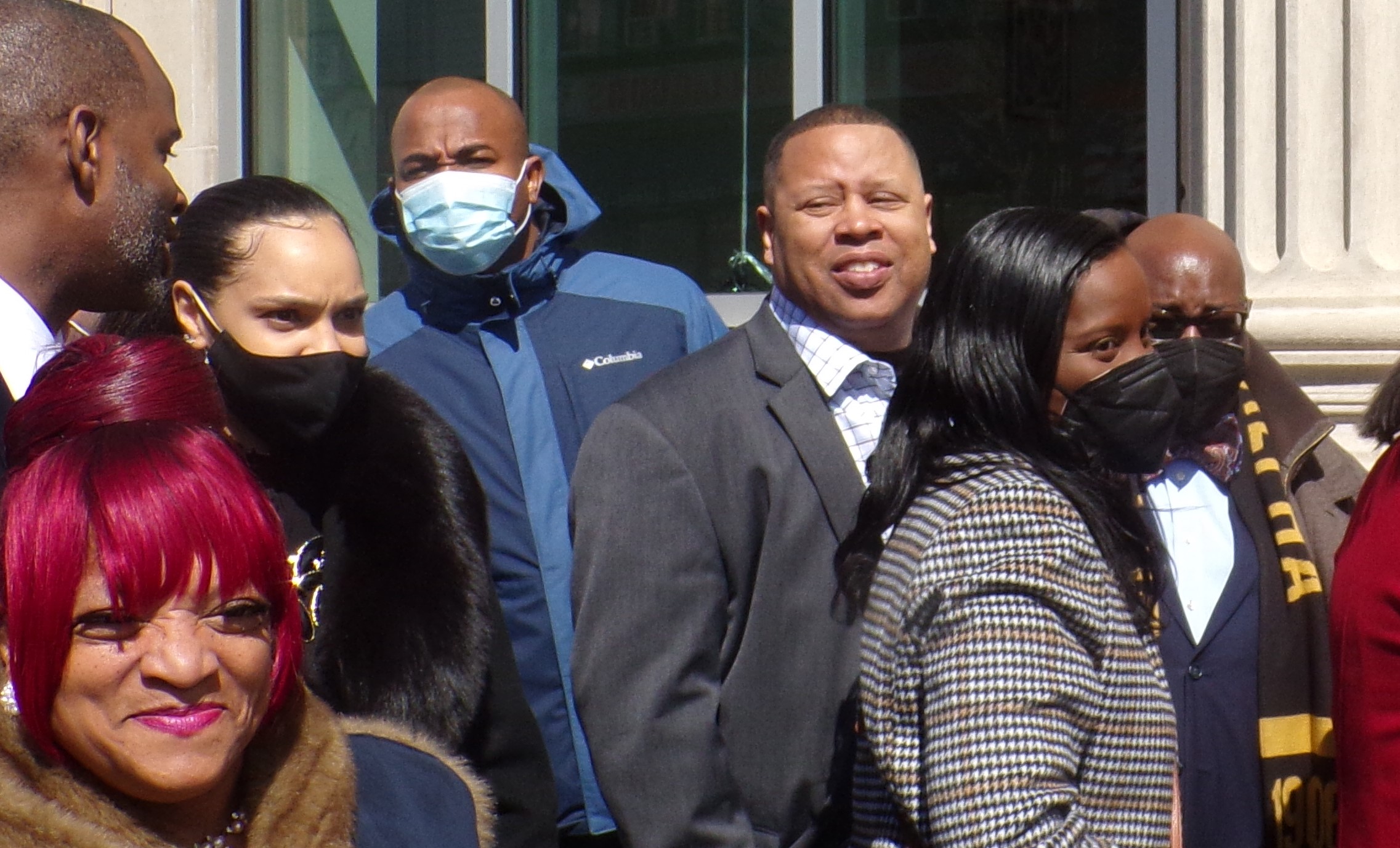John Sharpe James: 'I'm Never Going to Leave Public Life'
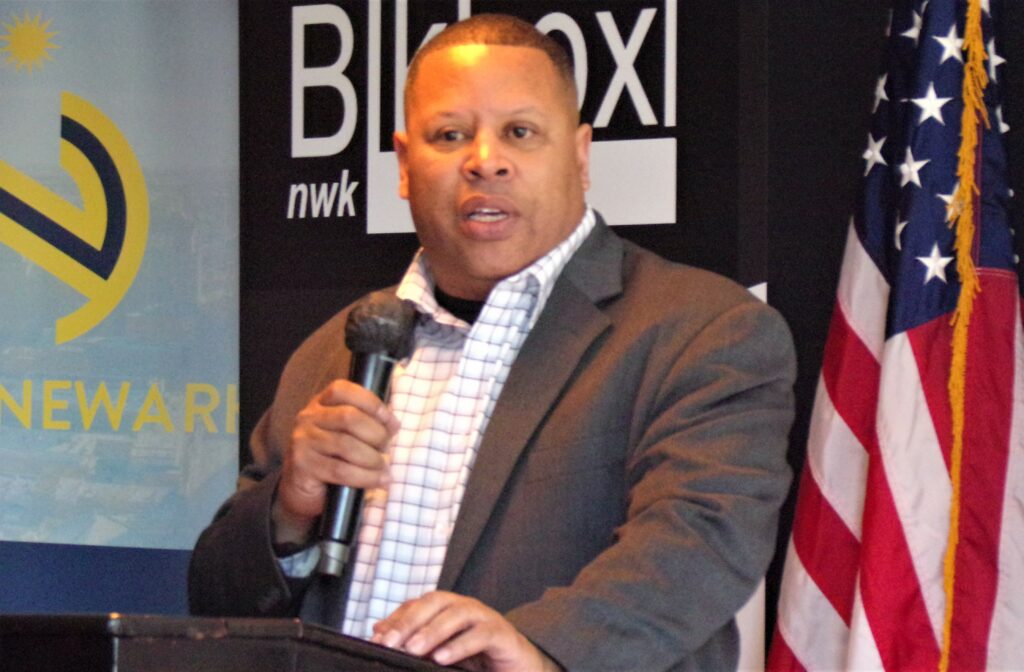
Never natural allies given their political histories and philosophies, they ended up blown into the same foxhole during the Booker era, and surfaced on a resistance ticket together in 2010, when then-Mayor Cory Booker sought his second term and had to contend with the formidable Newark pairing of Ras Baraka and John Sharpe James.
The two men had grown increasingly inevitably aligned, as those next generation Newark politicians skeptical of Booker, presenting themselves as the grounded local leadership alternative. James backed Baraka's unsuccessful reelection effort as at-large councilman in 2006. "It was then we spent the most time together," James said. "Something wasn't right with the top of the ticket. We didn't see the detailed time spent. I remember one day vividly, asking him [Ras], 'Do you want to run for mayor? I'm not feeling the head of the ticket.' The bottom line was we both agreed that it was more a case of the darling of non-Newarkers leading the city. That's what made my worry."
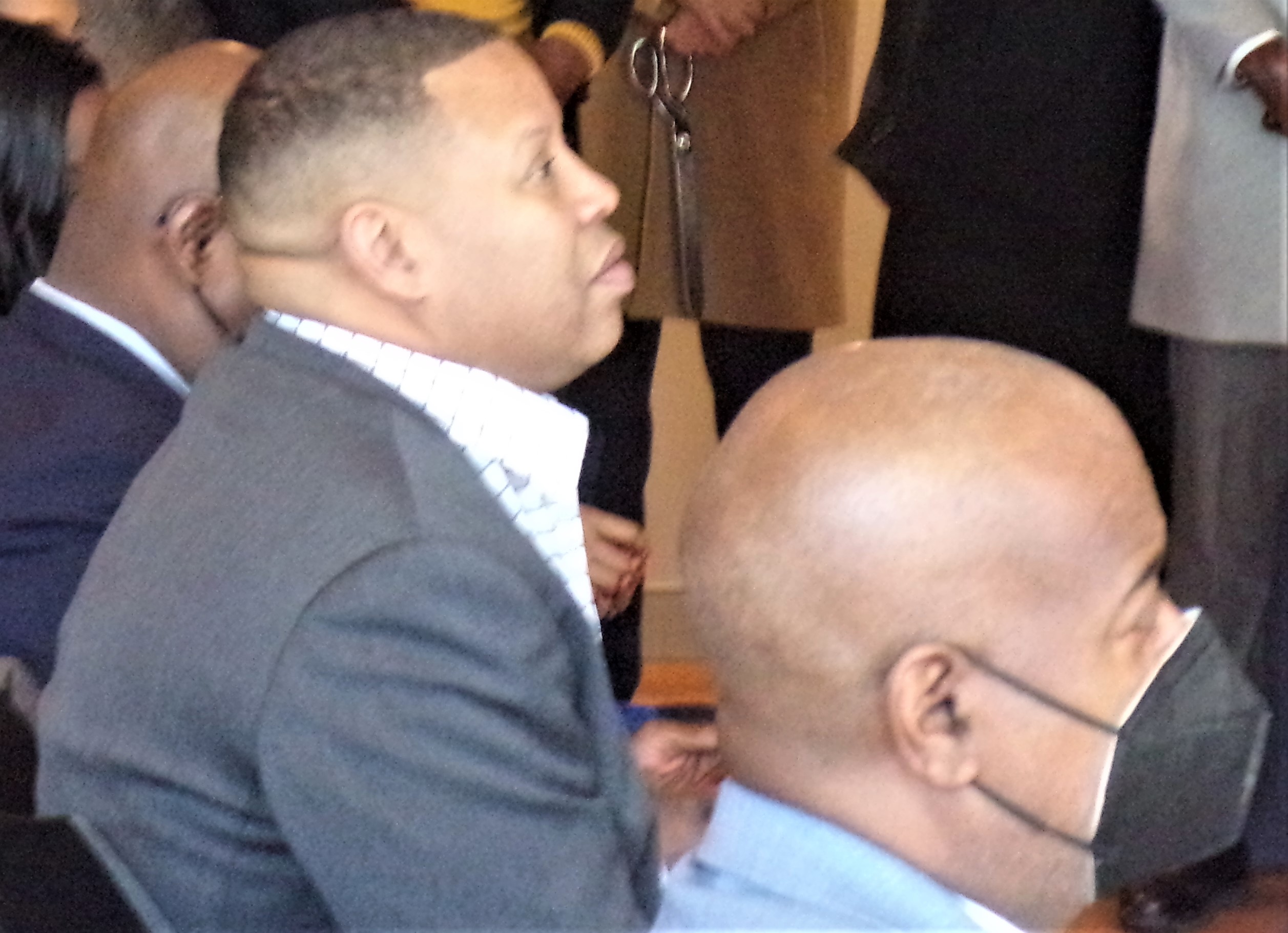
The decision by then-Mayor Sharpe James not to run again created an opening for state Senator Ronald L. Rice (D-28) to oppose Booker.
He lost.
Four years later, on a ticket with the gobsmacked Clifford Minor, Baraka ran as the South Ward candidate and James as the ticket's at-large choice, incidentally at the same time former Mayor Sharpe James returned to Newark from prison, welcomed home by his son who led an entourage of motorcycle riders to Penn Station. Of course, the transition from the James to the Booker era also hurt the younger James personally, and put that much more of a spring in his political counter-offensive.
He would get revenge, of a kind, albeit somewhat unconventionally, not that that was the goal, but if he and Baraka had different family histories that sometimes collided (Baraka received eight percent of the vote in a challenge of Sharpe James in 1994), they counted themselves mutually Newark-based; and confronted less the influence of Clinton Avenue than Silicon Valley.
Baraka would go on to win in 2010, and although the younger James lost his citywide stab at the seat, he maintained his ties to Team Baraka and in 2013 filled the unexpired term of Donald Payne, Jr. as an at-large councilman (Payne went from councilman to congressman after his father died in office); and then occupied the 2014 Baraka ticket as the South Ward representative when Baraka ran for mayor against Shavar Jeffries.
That time they both won.
The alliance held too, and continues to hold, even as John Sharpe James' father tried to file to run for an at-large council seat this year, denied by an attorney general's decision's based on the former mayor's conviction, and reasserted by the city clerk; and the son opted not to pursue reelection as the South Ward Councilman. "They're two different situations," said the retiring councilman, reflecting on his and his father's political circumstances. "I have done a considerable amount of work, and I didn't want to be councilman forever. The other one is a legal situation that could have been addressed prior to the election."
Finally, the son straddles that Newark no-man's land of being, between the father and the mayor, otherwise known as the condition of being his own man; in Councilman James' case, something the U.S. Army reinforced over the course of a nearly 24-year career, including a one-year combat tour in Afghanistan. Now, as he prepares for life after the city council, James considered the last eight years, a period in Newark politics that for him evolved in part as a reaction to what went before, which in turn bucked the prior administration, that of his dad, who ran City Hall for 20 years. Between the two of them, at least one member of the James family has held elected office in Newark for 28 years since 1986.
Even as Baraka goes forward, the absence of a James as an alternative itself represents another wrinkle of Newark political history.
James said he believes the turn the city took with Baraka as a corrective departure from the Booker years
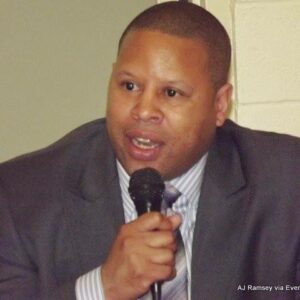
and the power structure that backed Jeffries, gave Newark a sustained positive direction. "When we came in, elected in 2014, we came in with a new mayor after seven years of Mayor Booker," James told InsiderNJ. "We walked into a $100 million deficit and a police department decimated by 167 layoffs. We had in front of us the challenge of preventing more layoffs and of rebuilding departments. Public safety was a problem and so was the issue of trying to prevent layoffs. We hired more officers, and as a councilman of the South Ward I maintained a high level of community engagement. I gave residents my direct cellphone number, and I was there for the community. ...We made ourselves very available. Beth Israel was rumored to be going out. It didn't. Path Train expansion was dead, and I reached out to Port Authority Chairman John Degnan and he agreed to put it back on track to be completed [a $2 billion project]."
James highlighted the demolition of the Seth Boyden Court Complex as the beginning of anchor development - including a movie studio - for an historically gloomy section of the South Ward. He supported renovations of all City owned Ward Parks, Weequahic Park field renovations, children play area renovations and a brand new $4.5 Million Dollar Senior Community Center.
While he reveled in the public service aspects of the job, the councilman grew somewhat weary of the negativity and, for lack of a better word, the stupidity, mean-spiritedness and superficiality of social media culture. He said he thrilled to the vibrancy of the local 2014 election, when 45,000 people voted in Newark, including 9,000 in the South Ward; turnout numbers that dipped to 28,000 four years later and just 5,000 people in the South Ward. IN addition to having participated in the reawakening of the city with Baraka, he felt proud to have witnessed the rise of Barack Obama, who stimulated an interest in government and politics in Newark and among African American voters.
"I believe Mayor Baraka has put a lot of effort into community-based initiatives... voting has never been a mainstay for African American community," James told InsiderNJ. "I'll never forget waiting in line for Obama." But the younger generation is not now fully adequately involved in the process, in a country distracted by social media and fake news.
"There come times in politics where everyone is just enamored of a candidate, and that was Obama, as the first African American nominee, who was expected to win and won, to become the first African American president, and he served his two terms but we fell in love with his personality and his family, and it's hard to duplicate that," said James. "Sometimes you don't catch that lightning in a bottle again. But the truth is, racism is still alive and well in our country. NJ.com disabled their comments because of too many discriminatory things being said. That's a news outlet that can't control the vitriol and racism. The trump era pulled back another layer and let people see what's going on in the minds of 50% of the country."
The Baraka Team allowed James to be part of something bigger than individual efforts in his hometown, even as he laments individualism amok nationally, which, coupled with siloed information and ignorance, prevents Americans from tackling the big problems of these times with substantial lasting impact, in his opinion. "What I learned from 23 and a half years in the Army is you have to work with other people," said James. "Your ego has to be quelled because you're not in charge. A lot of people miss that and some people want to run for office because of the money or they don't like person. I've heard some of the most petty reasons. I'm not going to feed into negativity. I won every district in the South Ward during the two races I won."
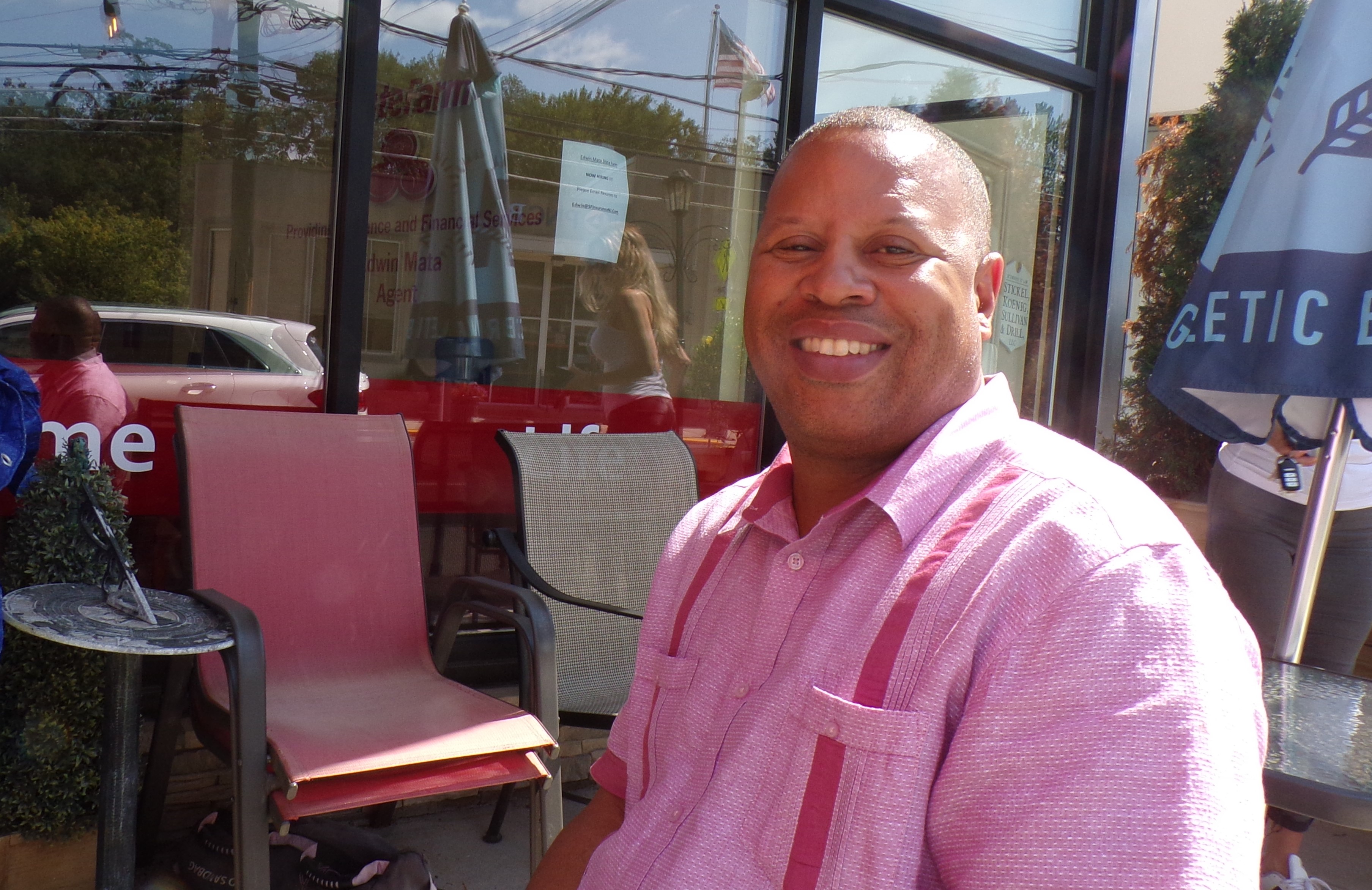
He's a little tired, perhaps.
But "I'm never going to leave public life," James said. "My father was elected to the city council when I was two years old. I participated in campaigns every year or two years after that. I'm a public figure in Newark. Not too many people do not know who I am. Someone gets mad because I moved [from one section of the South Ward to another] and says I don't live here anymore. It's part of it. In the end, I have no problem with frustrated residents. I have an issue with people who always blame politicians for things that have been going on for 100 years."
James believes society has become too soft, and too eager to allow people to escape responsibility. Every chance he gets he argues for home ownership and individual accountability, while seeking protections for Newarkers operating within the rules on fixed incomes who are the targets of outside developers.
"Bail reform does not work; letting people off instead of serving time does not work," said the councilman. "I did not support marijuana becoming legal. We already have an alcohol problem in our community, and now we're adding marijuana. I don't want teachers using marijuana teaching our kids. I don't want a barber on marijuana cutting my hair." Now, that it's legal in New Jersey, he said the council must ensure the funds raised from taxes truly go back into the community to help people. In addition, the council needs to implement smart distribution spheres so it doesn't engulf the city.
James' retirement from the council means an open contested seat in the South Ward, and the
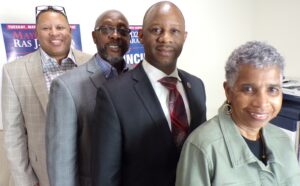
councilman backs the Team Baraka candidate, City Recreation Director Pat Council. "Pat's been honest and open does so many things outside City Hall, unlike others who just want to get into City Hall to gossip and don't have sincere organizations outside of City Hall. I hear the talk. The fact is I didn't use a city vehicle, gas or phone. I didn't use any of the perks that many other elected officials have used. It's amazing when someone does exactly what they say, and it's irrelevant because people run around out there saying things like 'he didn't go to meetings.' We have aides. There are 1000's of public meetings a month. These people who are running against Pat, they don't come to council meetings, so how can they be taken seriously?"
The developing contest underscores the overall ugliness of the era, in his judgement.
"I think in political office we shouldn't be so one-sided to the point that if it's not my way it's the highway," the councilman said. "We need to be more respectful and more civil to each other. Trump brought out a nasty side of the American people. We need a restoration of that time where facts can be researched and traditions upheld: the family structure, two heads of a house, two incomes under one room raising children. These are the basic building blocks. Everyone is so far from that now. Everyone is going in different directions. We need teamwork and respect for one another. ...We need to be more humble as opposed to more abrasive."
Twenty years ago, the same year Booker ran against his father, the United States authorized President George W. Bush to go to war in Iraq; and now, Russian President Vladimir Putin's invasion of Ukraine threatens to nuclearize the world, as the United States and NATO stand at the precipice.
James approves of Biden's leadership and decision-making to date as it relates to the war in Ukraine.
"Number one, I believe today, as I did then, that we are spending way too much money on the military," said James, who retired as a career military man. "People neglected in our economy, and I don't have an issue focusing more on domestic issues. We can't be a policeman for the entire globe. We are imposing sanctions and sending equipment, but we can't control everything. At what cost? 50K to 100K lives over ten years, so what, at the end of it, Russia can attack Ukraine again? I don't wish war on anybody. I just pray for the families and troops. In the meantime, do I believe the NATO sanctions are working? Absolutely. I think the real loser is Russia, being decimated."
Despite the internal fractures, and lurid revelations or confirmations of hatred, he said he still believes the United States is the greatest nation on earth. "We may be forced to come together by time and by necessity," he said. "The racial lines are being shortened every year with blending.
"Overall, I think the investment [by developers during the Baraka years] has good in the city," he added of his hometown. "I understand the push against gentrification, and that's why we have the inclusionary zoning ordinance. I think a lot of people feel more comfortable about Newark as opposed to the time of the riots. I met the president and vice president of Seton Hall a couple weeks ago and they are excited to be playing in the Prudential Center. There's a new coach bringing new energy. I went to a hockey game last week. It's exciting. We just need to keep at it, and remember those residents who have been here forever. We are a city, there are going to be changes, and unless we own our real estate we won't be able to control our destiny as we must.
"And we can never forget," added James, "that even as a city, we have a small town mentality."
